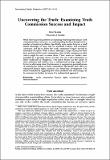| dc.description.abstract |
While there is growing interest in examining what long-term impact truth commissions have on society, our understanding has been hampered by a number of empirical problems. Specifically, most studies focus on a small biased subsample of cases, rely on anecdotal evidence and normative conviction, and fail to follow the truth commission’s legacy beyond its immediate reception. What is more, although a range of purposes have been put forward for truth commissions, there is little consensus on what criteria might be used to assess them. These issues are further com- pounded by a growing chorus of critics who see truth commissions as either ineffectual or dangerous. This article fleshes out the nature of these problems and outlines how a multimethod strategy might be ef- fective in addressing them. Furthermore, it suggests two potential means of assessing the impact of truth commissions, specifically their effect on subsequent human rights practices and democratic development. The article concludes by suggesting how some problems with this strategy can be overcome by further iterations of a multimethod approach. |

